

58
DECEMBER 2014
•
WORLD AQUACULTURE
•
WWW.WA S.ORG•
Land acquisition in the Delta by non-indigenous people is
very difficult and suitable areas for shrimp farming tend to be also
oil-rich areas.
There is presently great local and national opposition to
shrimp farming. Critics have expressed their fears based on the
experiences of other nations that have had challenges from the
venture. Some of the reasonable challenges envisaged are:
Destruction of Mangroves.
Nigeria contains the fourth largest
area of mangrove forest in the world and the program being
supported by the Food and Agricultural Organization (FAO) may
spell disaster for these vital wetlands. Added to the already heavy
handedness and ongoing destruction by the oil industry in Nigeria,
commercial shrimp farming could deliver another serious blow
to the health and future of the Niger Delta mangroves and the
millions of local residents dependent upon these wetlands for their
livelihood and protection.
Disease.
The most damaging factor for shrimp farming during
the past decade has been disease outbreaks. Viral diseases have
damaged industries in China, Taiwan, Thailand, Vietnam, and
Ecuador. Good water quality and lower stocking densities appear to
be the best defense against all diseases.
As a novice, Nigeria has an advantage because these diseases
have yet to manifest themselves as there is no shrimp culture.
However, this potential problem serves to stress the benefits of
avoiding importing exotic species and thus the advantage of
having a known farmable species (
P. monodon
) already within
the local ecosystem. Importation of post-larvae at the early stages
of development of the industry should be avoided if possible, this
being the way some devastating viral diseases are believed to have
been transmitted
between and
within countries.
Pollution and
the Environment.
Whenever large
numbers of semi-
intensive and
intensive shrimp
farms concentrate
on the same river,
estuary or bay,
effluents can
lower the quality
of the surrounding
water, potentially
overwhelm the
environment and
create conditions
that favor shrimp
pathogens.
Moderate
discharges of
effluents from
shrimp farms can
have a beneficial
effect on the
environment,
enriching it without overwhelming it. The mangroves and
mangrove species that surround many shrimp farms thrive on
moderate amounts of nutrients from shrimp farms. In turn, the
mangroves prevent erosion and reduce turbidity by trapping
sediments and binding nutrients. Nigeria can learn from
Ecuador where extensive shrimp farms operate in a comfortable
balance with the mangroves. In Thailand and Ecuador, shrimp
farmers restore and protect mangrove areas. The Administrative
Organization Act empowers local communities to manage and
conserve natural resources and the environment in their localities.
These powers enable local communities to regulate any activities in
their area, including aquaculture.
Code of Conduct standards must be developed and
implemented in the marine shrimp culture industry. Standards are
a systematic approach to manage shrimp production to achieve
international quality recognition and to manage impacts across
the whole value chain, from farm to processing plant, to maintain
a sustainable marine shrimp culture industry. Standards include
guidelines for operation of shrimp hatcheries and farms and for
harvesting and transportation from farms to processing plants,
distributors and exporters. Standards provide a certification
process that addresses a variety of issues, including the use of feed,
veterinary drugs and other chemicals.
In addition, good aquaculture practice guidelines must be
implemented for hygienic shrimp production and processing. To
produce good quality and safe marine shrimp for consumers,
shrimp farms must be standardized, clean, sanitized and generate
minimal environmental impacts. Furthermore, shrimp health
management must avoid use of therapeutic agents and chemicals
that lead to residues in shrimp.
Expected Government Participation
Government participation should consist of the following
activities:
•
Provide necessary support, which could include land,
selection of appropriate pilot areas.
•
Take measures to reduce costs of materials and equipment
for shrimp/prawn production and processing.
•
Improve roads and increase transport options from
producing areas to processing plants and from there to the port.
•
As was done for fish farming, the government should
champion this cause of establishing standard hatcheries and
encourage private entrepreneurs to do the same. The hatcheries will
accordingly be set up to sell post-larvae at a reasonable cost.
•
Continue streamlining port operations to reduce cost and
theft.
•
Encourage more favorable monetary and fiscal policies.
•
Assist with export promotion in cooperation with the
Nigerian Export Promotion Council (NEPC).
To achieve the desired Vision 20:2020 and millennium goal
of rapid agricultural development, commercial shrimp farming
can play a vital role. Despite numerous challenges to operation,
shrimp farming in the Niger Delta should be encouraged, putting
in place all the necessary precautionary measures for sustainable
production.
Delta Hy
and co
aquacultu
complet
enginee
Ou
Ga
Ai
Po
Pla
Te
Ele
Co
Hy
Delta pre
for cus
Optima
Op
Office: 7
ww
dronics provides c
oling solutions for
re applications or
e design/build ser
ring, equipment a
r Product Offering
s Fired Boilers/He
r Cooled Chillers &
lypropylene Heat
te & Frame Heat
mperature Contro
ctric Boilers & W
mbined Heat/Pow
brid Solar System
‐plumbs and skid‐
tomer installation
l Water Te
Means
timal Produ
27‐938‐2421 I Fax
w.deltahy
dustom heating
your specific
needs. We offer
vices including
nd installation.
s Include:
aters
Heat Pumps
Exchangers
Exchangers
ls
ater Heaters
er Turbines
s
mounts systems
and export.
mperature
ction
: 727‐938‐2311
ro.com















